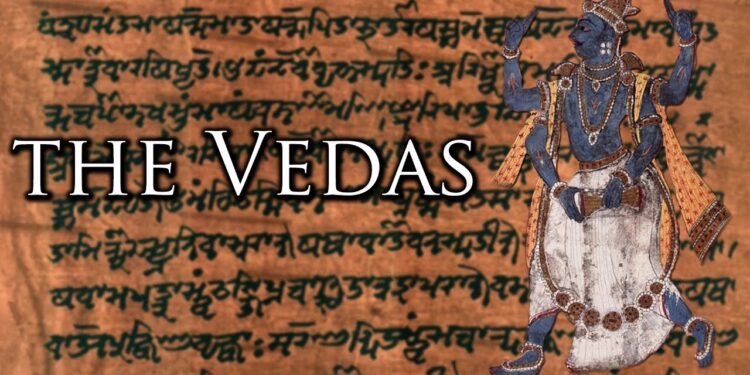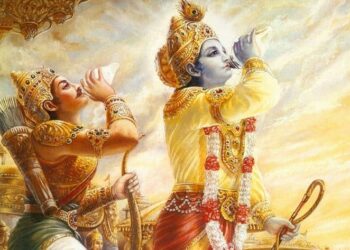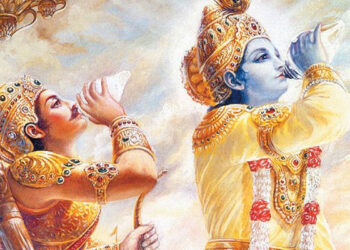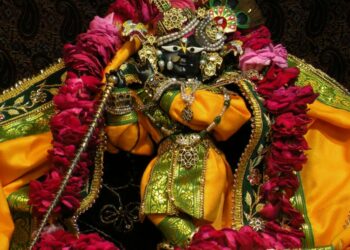Arjuna inquired:
O Kṛṣṇa, what is the situation of those who do not follow the principles of scripture but worship according to their own imagination? Are they in goodness, in passion or in ignorance?
(BG 17.1)
In the Fourth Chapter, thirty-ninth verse, it is said that a person faithful to a particular type of worship gradually becomes elevated to the stage of knowledge and attains the highest perfectional stage of peace and prosperity. In the Sixteenth Chapter, it is concluded that one who does not follow the principles laid down in the scriptures is called an asura, demon, and one who follows the scriptural injunctions faithfully is called a deva, or demigod. Now, if one, with faith, follows some rules which are not mentioned in the scriptural injunctions, what is his position? This doubt of Arjuna’s is to be cleared by Kṛṣṇa. Are those who create some sort of God by selecting a human being and placing their faith in him worshiping in goodness, passion or ignorance? Do such persons attain the perfectional stage of life? Is it possible for them to be situated in real knowledge and elevate themselves to the highest perfectional stage? Do those who do not follow the rules and regulations of the scriptures but who have faith in something and worship gods and demigods and men attain success in their effort? Arjuna is putting these questions to Kṛṣṇa.
The Supreme Personality of Godhead said: According to the modes of nature acquired by the embodied soul, one’s faith can be of three kinds—in goodness, in passion or in ignorance. Now hear about this.
(BG 17.2)
Those who know the rules and regulations of the scriptures but out of laziness or indolence give up following these rules and regulations are governed by the modes of material nature. According to their previous activities in the mode of goodness, passion or ignorance, they acquire a nature which is of a specific quality. The association of the living entity with the different modes of nature has been going on perpetually; since the living entity is in contact with material nature, he acquires different types of mentality according to his association with the material modes. But this nature can be changed if one associates with a bona fide spiritual master and abides by his rules and the scriptures. Gradually, one can change his position from ignorance to goodness, or from passion to goodness. The conclusion is that blind faith in a particular mode of nature cannot help a person become elevated to the perfectional stage. One has to consider things carefully, with intelligence, in the association of a bona fide spiritual master. Thus one can change his position to a higher mode of nature.
O son of Bharata, according to one’s existence under the various modes of nature, one evolves a particular kind of faith. The living being is said to be of a particular faith according to the modes he has acquired.
(BG 17.3)
Everyone has a particular type of faith, regardless of what he is. But his faith is considered good, passionate or ignorant according to the nature he has acquired. Thus, according to his particular type of faith, one associates with certain persons. Now the real fact is that every living being, as is stated in the Fifteenth Chapter, is originally a fragmental part and parcel of the Supreme Lord. Therefore one is originally transcendental to all the modes of material nature. But when one forgets his relationship with the Supreme Personality of Godhead and comes into contact with the material nature in conditional life, he generates his own position by association with the different varieties of material nature. The resultant artificial faith and existence are only material. Although one may be conducted by some impression, or some conception of life, originally he is nirguṇa, or transcendental. Therefore one has to become cleansed of the material contamination that he has acquired, in order to regain his relationship with the Supreme Lord. That is the only path back without fear: Kṛṣṇa consciousness. If one is situated in Kṛṣṇa consciousness, then that path is guaranteed for his elevation to the perfectional stage. If one does not take to this path of self-realization, then he is surely to be conducted by the influence of the modes of nature.
The word śraddhā, or “faith,” is very significant in this verse. Śraddhā, or faith, originally comes out of the mode of goodness. One’s faith may be in a demigod or some created God or some mental concoction. One’s strong faith is supposed to be productive of works of material goodness. But in material conditional life, no works are completely purified. They are mixed. They are not in pure goodness. Pure goodness is transcendental; in purified goodness one can understand the real nature of the Supreme Personality of Godhead. As long as one’s faith is not completely in purified goodness, the faith is subject to contamination by any of the modes of material nature. The contaminated modes of material nature expand to the heart. Therefore according to the position of the heart in contact with a particular mode of material nature, one’s faith is established. It should be understood that if one’s heart is in the mode of goodness his faith is also in the mode of goodness. If his heart is in the mode of passion, his faith is also in the mode of passion. And if his heart is in the mode of darkness, illusion, his faith is also thus contaminated. Thus we find different types of faith in this world, and there are different types of religions due to different types of faith. The real principle of religious faith is situated in the mode of pure goodness, but because the heart is tainted we find different types of religious principles. Thus according to different types of faith, there are different kinds of worship.
Men in the mode of goodness worship the demigods; those in the mode of passion worship the demons; and those in the mode of ignorance worship ghosts and spirits.
(BG 17.4)
In this verse the Supreme Personality of Godhead describes different kinds of worshipers according to their external activities. According to scriptural injunction, only the Supreme Personality of Godhead is worshipable, but those who are not very conversant with, or faithful to, the scriptural injunctions worship different objects, according to their specific situations in the modes of material nature. Those who are situated in goodness generally worship the demigods. The demigods include Brahmā, Śiva and others such as Indra, Candra and the sun-god. There are various demigods. Those in goodness worship a particular demigod for a particular purpose. Similarly, those who are in the mode of passion worship the demons. We recall that during the Second World War a man in Calcutta worshiped Hitler because thanks to that war he had amassed a large amount of wealth by dealing in the black market. Similarly, those in the modes of passion and ignorance generally select a powerful man to be God. They think that anyone can be worshiped as God and that the same results will be obtained.
Now, it is clearly described here that those who are in the mode of passion worship and create such gods, and those who are in the mode of ignorance, in darkness, worship dead spirits. Sometimes people worship at the tomb of some dead man. Sexual service is also considered to be in the mode of darkness. Similarly, in remote villages in India there are worshipers of ghosts. We have seen that in India the lower-class people sometimes go to the forest, and if they have knowledge that a ghost lives in a tree, they worship that tree and offer sacrifices. These different kinds of worship are not actually God worship. God worship is for persons who are transcendentally situated in pure goodness. In the Śrīmad-Bhāgavatam (4.3.23) it is said, sattvaṁ viśuddhaṁ vasudeva-śabditam: “When a man is situated in pure goodness, he worships Vāsudeva.” The purport is that those who are completely purified of the material modes of nature and who are transcendentally situated can worship the Supreme Personality of Godhead.
The impersonalists are supposed to be situated in the mode of goodness, and they worship five kinds of demigods. They worship the impersonal Viṣṇu form in the material world, which is known as philosophized Viṣṇu. Viṣṇu is the expansion of the Supreme Personality of Godhead, but the impersonalists, because they do not ultimately believe in the Supreme Personality of Godhead, imagine that the Viṣṇu form is just another aspect of the impersonal Brahman; similarly, they imagine that Lord Brahmā is the impersonal form in the material mode of passion. Thus they sometimes describe five kinds of gods that are worshipable, but because they think that the actual truth is impersonal Brahman, they dispose of all worshipable objects at the ultimate end. In conclusion, the different qualities of the material modes of nature can be purified through association with persons who are of transcendental nature. [As-They-Surrender-Unto-Me ]
Those who undergo severe austerities and penances not recommended in the scriptures, performing them out of pride and egoism, who are impelled by lust and attachment, who are foolish and who torture the material elements of the body as well as the Supersoul dwelling within, are to be known as demons.
(BG 17.5 – 17.6)
There are persons who manufacture modes of austerity and penance which are not mentioned in the scriptural injunctions. For instance, fasting for some ulterior purpose, such as to promote a purely political end, is not mentioned in the scriptural directions. The scriptures recommend fasting for spiritual advancement, not for some political end or social purpose. Persons who take to such austerities are, according to Bhagavad-gītā, certainly demoniac. Their acts are against the scriptural injunctions and are not beneficial for the people in general. Actually, they act out of pride, false ego, lust and attachment for material enjoyment. By such activities, not only is the combination of material elements of which the body is constructed disturbed, but also the Supreme Personality of Godhead Himself living within the body. Such unauthorized fasting or austerities for some political end are certainly very disturbing to others. They are not mentioned in the Vedic literature. A demoniac person may think that he can force his enemy or other parties to comply with his desire by this method, but sometimes one dies by such fasting. These acts are not approved by the Supreme Personality of Godhead, and He says that those who engage in them are demons. Such demonstrations are insults to the Supreme Personality of Godhead because they are enacted in disobedience to the Vedic scriptural injunctions.
The word acetasaḥ is significant in this connection. Persons of normal mental condition must obey the scriptural injunctions. Those who are not in such a position neglect and disobey the scriptures and manufacture their own way of austerities and penances. One should always remember the ultimate end of the demoniac people, as described in the previous chapter. The Lord forces them to take birth in the wombs of demoniac persons. Consequently they will live by demoniac principles life after life without knowing their relationship with the Supreme Personality of Godhead. If, however, such persons are fortunate enough to be guided by a spiritual master who can direct them to the path of Vedic wisdom, they can get out of this entanglement and ultimately achieve the supreme goal.
Purports by HDG A.C Bhaktivedanta Swami Srila Prabhupada



















